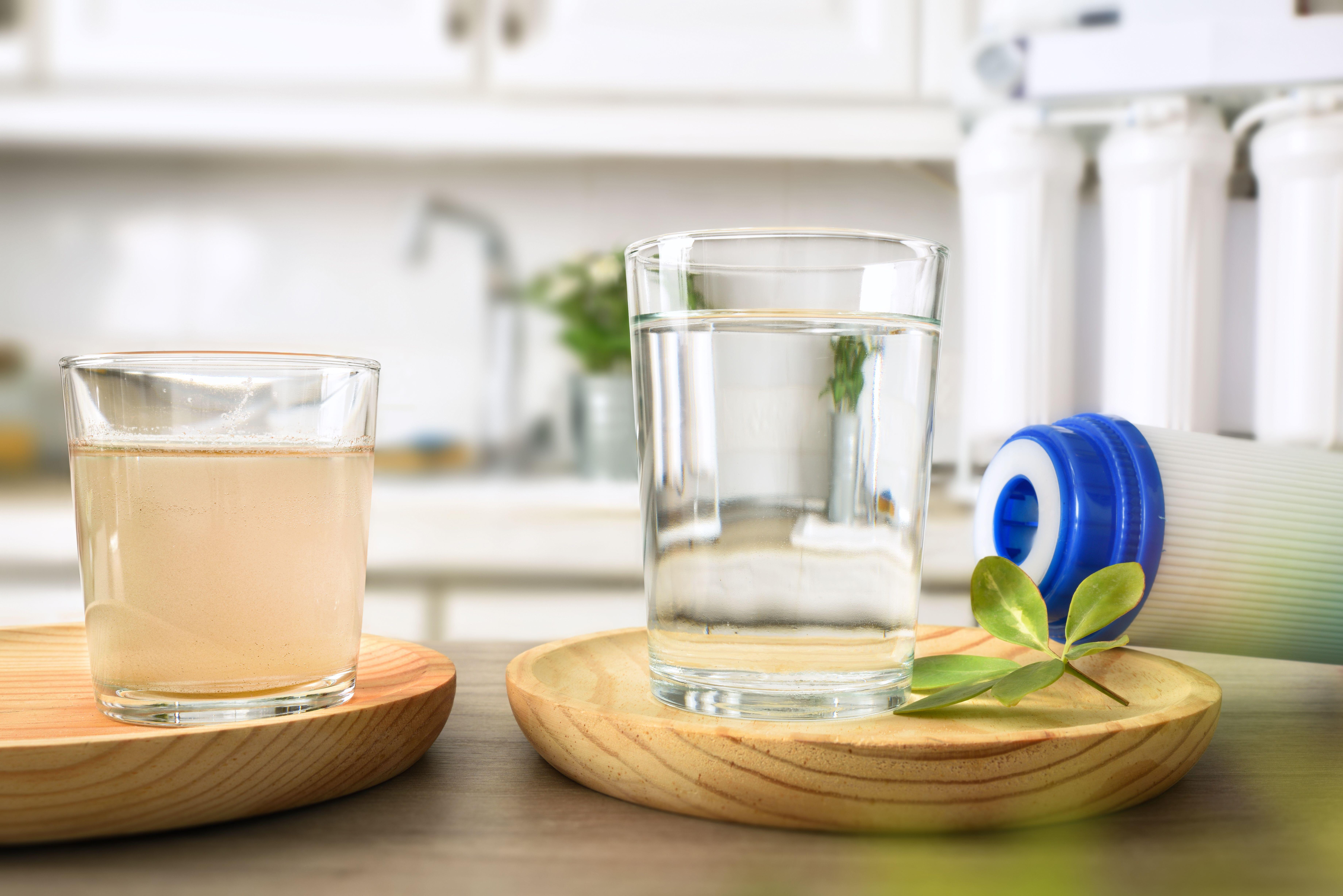Why is my tap water cloudy? The 3 common causes – and what to do
Experts answer questions on why tap water is cloudy, how to deal with it, and whether it's safe to drink


Design expertise in your inbox – from inspiring decorating ideas and beautiful celebrity homes to practical gardening advice and shopping round-ups.
You are now subscribed
Your newsletter sign-up was successful
Want to add more newsletters?

Twice a week
Homes&Gardens
The ultimate interior design resource from the world's leading experts - discover inspiring decorating ideas, color scheming know-how, garden inspiration and shopping expertise.

Once a week
In The Loop from Next In Design
Members of the Next in Design Circle will receive In the Loop, our weekly email filled with trade news, names to know and spotlight moments. Together we’re building a brighter design future.

Twice a week
Cucina
Whether you’re passionate about hosting exquisite dinners, experimenting with culinary trends, or perfecting your kitchen's design with timeless elegance and innovative functionality, this newsletter is here to inspire
Ever wondered why sometimes tap water is cloudy? The good news is that the most common cause of cloudy tap water is trapped air, meaning it is completely safe to drink.
However, this does not mean it is ideal, and you will, of course, want to ensure that it is trapped air that is causing the cloudy water. If it isn't trapped air, the reasons why your tap water might be cloudy can mean varying solutions, so the first step is discovering which, if any, of the reasons below are the cause of your water troubles.
We asked plumbing professionals for the reasons why tap water is cloudy, and how to prevent it, plus how to spot when cloudy tap water means there is a wider problem with your home heating or pipework.
Before you call a plumber or look to change a kitchen faucet, check our experts' advice.
Why is my tap water cloudy?
Not only does cloudy tap water look cloudy, it could be unsafe to drink, so it's vital you discover why your tap water is cloudy, before you can work out how to fix it, if you can. Here, we take you through the various causes, and solutions
1. Cloudy water is caused by harmless air bubbles
The cause: The most common reason why your tap water is cloudy is likely due to tiny air bubbles trapped in the pipework. This can be caused by a change in your water supply's pressure, which in turn might be as a result of a burst pipe or repair work nearby.
This type of cloudy tap water is completely harmless and you can drink it. But to be sure, the best way to check if this is the cause of the problem, according to Harry Knowles, a plumbing coordinator at Fantastic Services working with My Plumber, is to ask your neighbors if they are experiencing the same issue.
Design expertise in your inbox – from inspiring decorating ideas and beautiful celebrity homes to practical gardening advice and shopping round-ups.
If the issue is only based within your household you may need to contact a plumber or your local water authority to rule out any pipework issues in your own house, and stick to bottled water in the meantime.
The solution: If your water is cloudy due to trapped air in the pipework, then it is most likely that the water will naturally clear after a few minutes of being in a pot/glass/bat as the air rises out of the water.
David Cruz, plumbing expert at My Job Quote, suggests that to help release air from the pipes you should locate the cold water tap that is closest to the 'internal stop tap at the first entry point to the asses on a slow, steady flow. Then try turning the inner stop tap on and off about four to six times while the tap is running which will hopefully release air from the pipes.'
Although cloudy water may be harmless, it can act as an important indication that something is wrong with your pipes. Business utilities expert CEO Phil Foster at Love Energy Savings advises that cloudy water that's a sign of aeration can be put down to a burst water pipe or leak.
Ignoring this problem can be costly, as a leaky tap, for example, can cause 5,000 gallons of water loss in a year and may cause damage or damp around the leak. Plus, of course, it will increase your water bills. The best way to identify in-house leaks is to check the pipes in your house for rust and ceilings, walls and floors for water damage.
2. You live in a hard water area
Another harmless cause of cloudy tap water is if you live in a hard water area, and there's a limescale build-up in your pipes. Limescale is chalky white deposits, which may have formed inside faucets or pipework connected to the boiler. The most common way to treat this is with a water softener that filters out the hard water minerals
Since hard water is due to a high mineral content, plumber Harry Knowles suggests removing them with a hard water filter with 'polyphosphate scale inhibitors, water softeners and calcium treatment units'. These can be retro-fitted on to pipework and can dramatically reduce the damage that hard water can do to pipework, including the delivery of cloudy water.
Our experts warn that if hot tap water is cloudy it may indicate a problem with the boiler which will require a plumber.
3. There are particulates or sediment in the water
Plumber Harry Knowles suggests that before calling for assistance, you double check if there is a more serious issue than air bubbles trapped in pipes by running all cold water taps in your house for a few seconds. Next, gather some water in a transparent glass from a running tap. Leave the water in the glass to see if the cloudiness clears. If the water is still cloudy after 24 hours then there is probably an issue. In this case, call your local water company to see if maintenance is being done or if your water has been impacted by an issue with you local water supply.
'If you find that you’re only experiencing cloudy water from one of your faucets, remove the aerator, clean it with a solution of 50 per cent water and 50 per cent vinegar, rinse, and reinstall. If the problem persists, contact a plumber for assistance.'
Is cloudy tap water safe to drink?
If the cloudy tap water is white, it is likely that the cause is tiny air bubbles, which are usually safe to drink. If it is caused by limescale, it is safe to drink, though over time this can damage pipework and appliances, so you will want to fit a water softener to remove the minerals from the water.
If, however, the cloudy water is a bad color, too, such as yellow, green or brown, it can be harmful to drink as it may contain contaminants.
To ease your mind about the quality of your water you can get an at-home testing kit to check for common contaminants in your water. Varify's Complete Water Test Kit is the most highly rated on Amazon.
Can cloudy water make you sick?
White, cloudy drinking water is usually safe, assuming it's just caused by trapped air. On the other hand, water that has a colored tint (such as yellow, green or brown) can be harmful, caused by a contamination of the water by rust or sludge built up from a blockage.
Who do I call if I have cloudy tap water?
Plumber Harry Knowles suggests that before calling for assistance, you double check if there is a more serious issue than air bubbles trapped in pipes by running all cold water taps in your house for a few seconds. Next, gather some water in a transparent glass from a running tap. Leave the water in the glass to see if the cloudiness clears. If the water is still cloudy after 24 hours then there is probably an issue. In this case, call your local water company to see if maintenance is being done or if your water has been impacted by an issue with you local water supply.
'If you find that you’re only experiencing cloudy water from one of your faucets, remove the aerator, clean it with a solution of 50 per cent water and 50 per cent vinegar, rinse, and reinstall. If the problem persists, contact a plumber for assistance,' he says.
Is it bad if newly plumbed pipes have cloudy water running from them?
Cloudy water can result from a change in water pressure in the pipes or new plumbing work, so it is not necessarily bad if newly plumbed pipes dispense cloudy water.

Lola Houlton is a news writer for Homes & Gardens. She has been writing content for Future PLC for the past six years, in particular Homes & Gardens, Real Homes and GardeningEtc. She writes on a broad range of subjects, including practical household advice, recipe articles, and product reviews, working closely with experts in their fields to cover everything from heating to home organization through to house plants. Lola is a graduate, who completed her degree in Psychology at the University of Sussex. She has also spent some time working at the BBC.